Farther Along
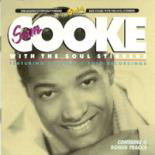 |
Farther Along has become such a gospel standard that it seems to have been around forever. Published versions date back at least to 1911 and we can be sure that various combinations of the lyric and melody predate that. The primary vehicle for the song's long ride has, of course, been the church, and it has been popular in both historically white and black denominations. We'll start our survey with two very different approaches from African-Americans. First, a recording by The Soul Stirrers featuring the Sam Cooke before he made the switch to performing popular music in the late 1950's. Then, the great Mississippi John Hurt accompanying himself on solo fingerstyle guitar.
Audio Clip: Sam Cooke and the Soul Stirrers sing Farther Along
Audio Clip: Mississippi John Hurt sings and picks Farther Along
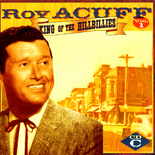 |
Gospel was very good to the King of Country Music, Roy Acuff. His take on The Great Speckled Bird is said to have gotten him both his first chance to record and rave reviews at his first appearance at the Grand Ole Opry in 1938. The relative simplicity of his recording of Farther Along reflects Acuff's take on the "hillbilly" music he loved. "The music is down to earth, for the home — not to get all hepped up and smoke a lot of marijuana and go wild about. The music is full of Christianity and sympathy and understanding. It helps make people better." (As quoted in a Look magazine interview.) Alright then, see if this doesn't make you better:
Audio clip: Roy Acuff sings Farther Along
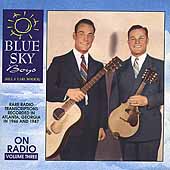 |
The Blue Sky Boys are another very influential early country group who had little use for the "hepped-up" musical tastes of post-war America and for whom gospel music was central. But unlike Acuff — who capitalized on the growing popularity of country music through his successful Acuff-Rose music publishing house — Bill and Earl Bollick were disinclined to bend with the times and had largely left the music business by 1951, only to be coaxed out of retirement occasionally in the 60's and 70's by folk music promoters looking for the proverbial real deal. That's exactly what you hear in their recordings of the 30's and 40's, when The Blue Sky Boys helped set the standard for country "brother duets" with their unadorned but intricate harmonies and tasteful instrumentals. Here they are in a live radio broadcast not long after both men were discharged from the military, having served for some 5 years during World War II.
Audio Clip: The Blue Sky Boys (with Sam "Curley" Parker) perform Farther Along
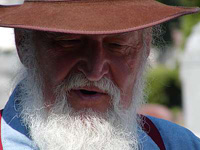 |
If the words to Farther Along are not your cup of theological tea, you might want to slip into a pew beside Woody Guthrie. The song's original lyrics pose the perienial question, "How can evil and suffering exist in a world ruled by a loving God?" All they offer by way of answer is, "Farther along we'll know all about it." To Guthrie this was just the kind of pie-in-the-sky hoo-ha that songs are born to skewer. His own lyrics reflect little pious faith, but an insistent outrage. Here's a sampling of Guthrie's reworked lyric, followed by an audio clip of the song, I've Got To Know, sung by a contemporary rabble-rouser in the same tradition, Utah Phillips (shown left).
I've got to know, yes, I've got to know, friend;
Hungry lips ask me wherever I go!
Comrades and friends all falling around me
I've got to know, yes, I've got to know.Why do your war boats ride on my waters?
Why do your death bombs fall from my skies?
Why do you burn my farm and my town down?
I've got to know, friend, I've got to know!
Audio Clip: Utah Phillips singing Woody Guthrie's I've Got To Know
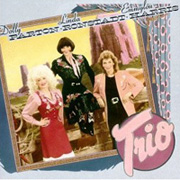 |
Lest you think this song is only sung by men, we'll give the last note to a power trio of female vocalists: Dolly Parton, Linda Ronstadt and Emmylou Harris. Their 1987 album, Trio, reached number 1 on the U.S. country album charts and won two Grammy Awards. Farther Along was the big finale on that big hit record. Our clip features Emmylou singing the lead.
Audio Clip: Dolly Parton, Linda Ronstadt and Emmylou Harris singing Farther Along
Recommended Recordings
All Community Guitar Resources text & material © 2006 Andrew Lawrence
